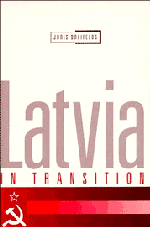Book contents
- Frontmatter
- Contents
- List of table
- Acknowledgments
- Introduction
- 1 Historical residues and impact on present-day politics
- 2 The Latvian national rebirth
- 3 Regaining independence – establishing democracy
- 4 Economics and reform
- 5 Demography, language and ethnic relations
- Conclusion
- Notes
- Select bibliography
- Index
1 - Historical residues and impact on present-day politics
Published online by Cambridge University Press: 01 June 2011
- Frontmatter
- Contents
- List of table
- Acknowledgments
- Introduction
- 1 Historical residues and impact on present-day politics
- 2 The Latvian national rebirth
- 3 Regaining independence – establishing democracy
- 4 Economics and reform
- 5 Demography, language and ethnic relations
- Conclusion
- Notes
- Select bibliography
- Index
Summary
In the struggle for Latvia's independence, history became a major vehicle for destabilizing communist rule. The first protests of 1987, which initiated the awakening in Latvia, were exercises in historical recall and were widely designated as the “calendar demonstrations.” Demonstrators attempted to open doors to realities of the past that the Soviet regime had forcibly closed. These realities included the deportations to Siberia of tens of thousands of citizens on June 14, 1941 and March 23, 1949, the signing of the Molotov-Ribbentrop Pact of August 23, 1939 and the declaration of Latvian independence of November 18, 1918. The memorandum of the first Congress of the Latvian People's Front raised these as well as other historical issues such as Latvia's incorporation into the USSR in August 1940 and the purges of the Latvian “national Communists” in 1959. Soon, as well, the entire period of independence and the role of its most famous politician, Karlis Ulmanis, were placed on the agenda of important issues and analyzed at length in the public media. An editorial in Latvia's newspaper Cina on January 1, 1989 summarized the extraordinary impact of history in Latvia: “No branch of knowledge has gained such public attention during the last year among the most varied professions and age groups– as history. Never has there been such a need for a close relationship between historians and the nation, never have the events of the past so palpably resonated with the present.”
- Type
- Chapter
- Information
- Latvia in Transition , pp. 20 - 51Publisher: Cambridge University PressPrint publication year: 1996



